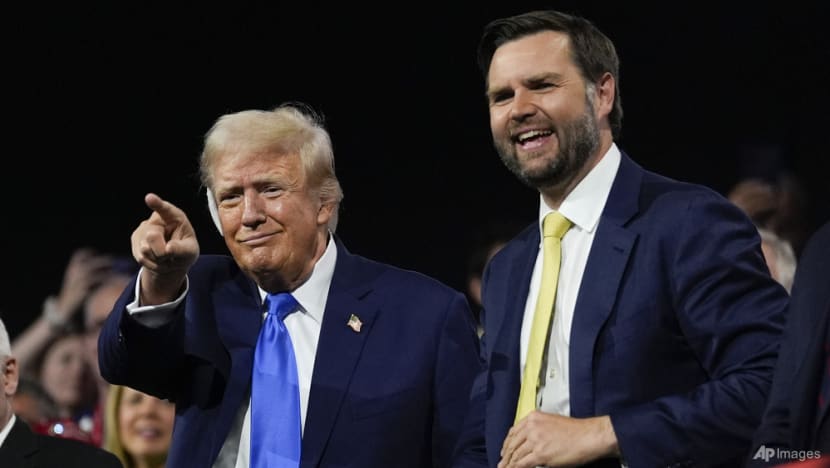Trump-Vance US presidency could mean tougher anti-China stance, say analysts
Donald Trump’s running mate JD Vance holds conservative views on China, calling the East Asian giant the “biggest threat” to the US.

Republican presidential candidate former President Donald Trump and Republican vice presidential candidate Sen. JD Vance, R-Ohio, attend the 2024 Republican National Convention at the Fiserv Forum, Tuesday, July 16, 2024, in Milwaukee. (AP Photo/Carolyn Kaster)

This audio is generated by an AI tool.
Donald Trump’s pick of JD Vance as his Republican vice-presidential running mate could mean an increasingly hawkish stance on China if the former United States president is re-elected, analysts told CNA.
“There's a bipartisan consensus about muscling up to a rising power in China, and Vance wants to counter China's growing technological and economic prowess,” said Tom Switzer, executive director of Australian think tank Centre for Independent Studies.
Vance, a junior senator from Ohio, called China the “biggest threat” to America in an interview shortly after his selection on Monday (Jul 15).
This falls in line with Trump’s – and even many Democrats’ – belief that China’s rise as the world’s factory has ruined the US’ manufacturing sector.
Switzer noted that many Republicans have gradually shifted their focus from Europe to Asia, and are intent on coordinating the efforts of those opposed to China’s ambitions to stand up collectively to Beijing.
“That supports tougher anti-China measures, including a trade and high-tech war, the development of closer relations with Taiwan, and the repudiation of Beijing's claim that most of the South China Sea is in its maritime territory,” Switzer told CNA’s Asia First programme.
Beijing has responded to Vance’s comments that it is “always opposed to the US making China an issue in elections”.
VANCE MORE CONSERVATIVE ON CHINA THAN TRUMP
Vance has views on China that are “probably a little more conservative” than Trump’s, said Gordon Flake, CEO of Perth USAsia Centre at the University of Western Australia.
Flake added: “Vance has a clear record in the year-and-a-half-plus that he's been in office of being what he calls an ‘economic nationalist’, calling on the US to revoke the ‘most favoured nation’ trade status with China and seeking to have a much more aggressive approach in terms of security. He's very focused on Taiwan.”
All members of the World Trade Organization are granted the ‘most favoured nation’ status, receiving preferential trade treatment such as lower tariffs and fewer barriers.
James Crabtree, distinguished visiting fellow at the European Council on Foreign Relations, pointed out that Trump had become increasingly concerned about China over the course of his first presidency from 2017 to 2021.
While in the White House, Trump launched a trade war against China that is still ongoing.
On the campaign trail this year, he suggested he would impose tariffs of 60 per cent or higher on all Chinese goods, as well as a 10 per cent universal tariff on all US imports.
Crabtree told CNA’s East Asia Tonight: “His policy platforms now have a lot of things that will be very unpleasant for China.
“It's more likely that under Trump, the US will seek to defend Taiwan and help Taiwan to defend itself because that is what the US perceives to be in its own interest.”
Related:
VICE PRESIDENTS HAVE ‘LIMITED ROLE’ IN FOREIGN POLICY
Nevertheless, the experts stressed that US vice presidents typically have a limited direct impact on US foreign policy.
Observers previously said Trump chose the 39-year-old as his running mate due to their similar ideologies.
“Ultimately, (they are elected) it will be the views of president Trump that matter, and vice president Vance would only support him,” Flake told CNA’s East Asia Tonight.
Trump was officially chosen as the Republican’s 2024 presidential nominee at the party’s convention on Monday (Jul 15) in Milwaukee, Wisconsin.
He is due to formally accept the nomination in a prime-time speech on Thursday. The presidential election will be held on Nov 5.
RUSSIA-UKRAINE WAR
Meanwhile, Vance has opposed US funding for Ukraine's defence against Russia's invasion.
In his Jul 15 interview, he said Trump would prioritise a negotiated end to the crisis so the US could focus on the "real issue" of China. "That's the biggest threat to our country and we are completely distracted from it," he added.
Switzer noted that Vance’s outlook “nicely complements” Trump’s view.
“It’s not isolationist. It’s about being selective and where America throws its weight and priorities around the world,” Switzer added.
“He’s made it clear in his time in the Senate – he wants American foreign policy to re-define resources, order strategic priorities away from Europe, away from the Middle East and focus on Asia to deal with a rising China.”
Crabtree said that if Trump is re-elected, the US will likely seek to reduce its commitments in the Ukraine war and to the North Atlantic Treaty Organization (NATO), posing a major problem to Europe.
VANCE REPRESENTS ‘FRESHNESS’
In terms of core policy issues, Switzer noted that Vance has tapped into widespread anxieties that have risen in the US in recent years amid global financial uncertainties, technological change, and cultural disruption.
“Vance, in some respects, represents freshness. He’s new; he’s highly intelligent,” Switzer said.
“He resonates with a lot of Americans who feel like they're the losers in the new America and they want to win again, and I think Vance complements Trump.”
Crabtree stressed that it will be risky to underestimate how radical and disruptive a second Trump presidency could be for both domestic and international politics.
He said American allies in Asia seem less wary of Trump – judging from his first term – compared with their European counterparts. This is because many in the region are apprehensive of Beijing’s ambitions, which means Trump’s stance on China “suited them just fine”.
He added: “Perhaps while the Europeans are panicking too much about Trump, in Asian capitals, leaders may be showing too little concern for the effects that he might have.”
















